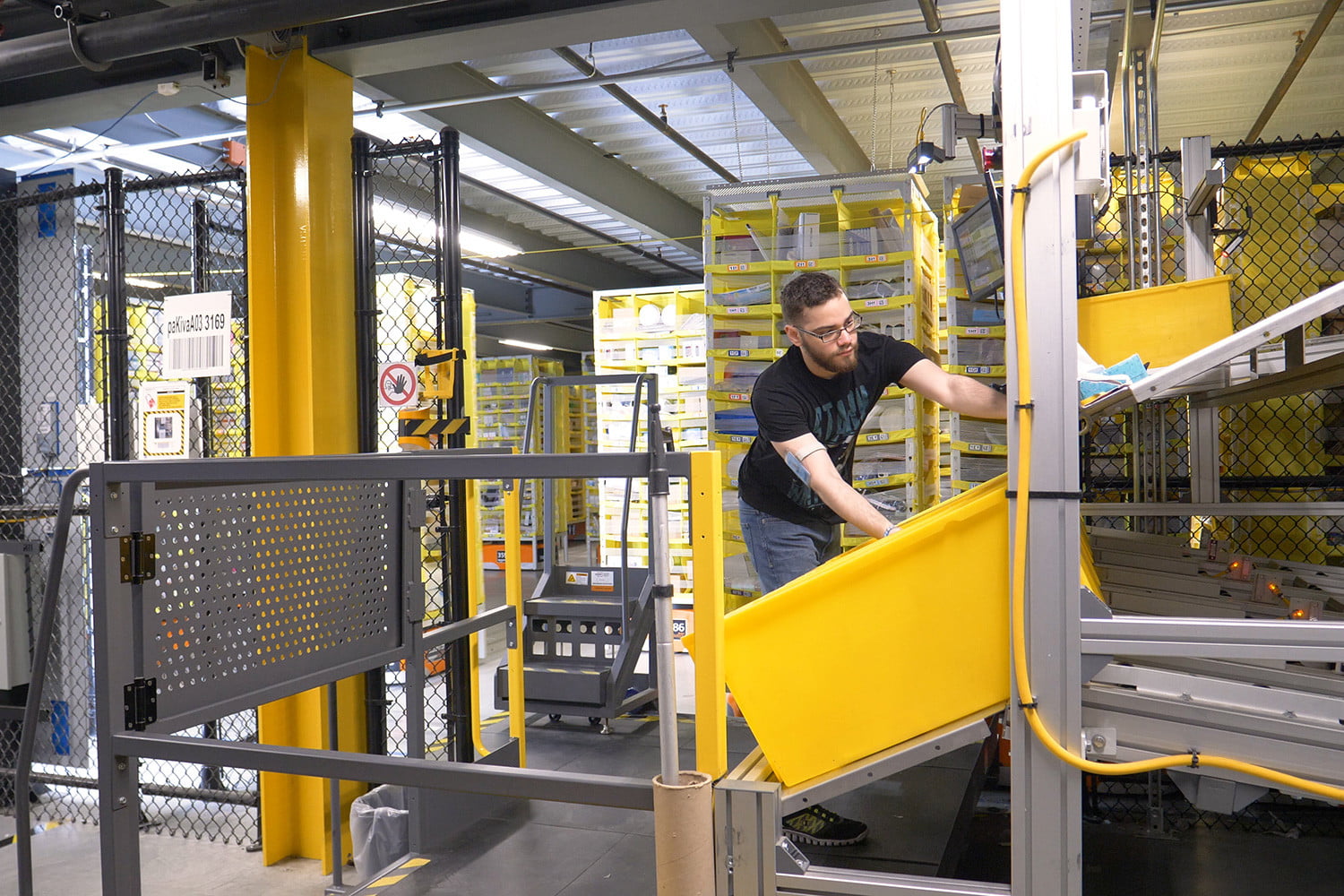The biggest shopping season of the year is upon us. And just in time, a new anti-Amazon initiative has revved up. As first reported in the New York Times, the coalition Athena launched Tuesday: it comprises more than 30 grassroots groups that represent everyone from digital activists to media types to warehouse workers, all united to take on the 800-pound gorilla that is the world’s largest retailer. Athena says its goals are to prevent worker abuse and shield their communities from Amazon’s detrimental effects.
But, this is Amazon. Amazon offers Prime shipping, which 48 percent of Americans have, and Americans love nothing more than easy consumerism. We’re also facing down the beginning of the 2019 holiday shopping season. According to Bloomberg, Americans spent $7.9 billion online on Cyber Monday last year, with Amazon reaping much of the profits. The New York Times reported the company’s projected sales for 2019 will be somewhere around $238 billion. In the meantime, Amazon paid $0 in federal income tax on an $11 billion profit in 2018.

We can take a guess as to what’s going to win in the battle of capitalism versus grassroots, pro-worker initiatives in 2019 America, especially come Black Friday. But activists speaking to Digital Trends said that the timing of the launch isn’t what matters: they’ll be here far beyond Black Friday and Cyber Monday to try and change the culture around Amazon.
Dania Rajendra, the director of Athena, told Digital Trends that she hopes the December holidays will actually drive home the point that the coalition is trying to make. “I’m still going to buy presents,” she said. “The holidays are a time when we reflect, as well as make sure that we’re expressing our affection for one another with stuff — that’s cool too. I think people can think about both.”
“Amazon is unique in its scale and the scope of its activity,” said Katie Wilson, the general secretary of the Transit Riders Union in Seattle, one of the more than 30 organizations that have joined the coalition. “The way it’s moving into different sectors of the economy, from making inroads with groceries, to big picture issues around privacy and surveillance, basically every aspect of our lives is more and more touched by one corporation that has unaccountable power.”
Amazon responded to these accusations in a statement provided to Digital Trends, saying that the new group is made up of “self-interested critics, particularly unions and groups funded by our competitors” who are taking advantage of the increased attention on the company over Black Friday.
“It’s no coincidence to us that this group would emerge now because large shopping events have become an opportunity for our critics, including unions, to raise awareness for their cause – in this case, increased membership dues,” the statement said. “These groups are conjuring misinformation to work in their favor, when in fact we already offer the things they claim to be able to provide.”
It is not clear whether Athena charges membership dues.
Both Rajendra and Wilson said that Athena was here for the long haul, and Rajendra confirmed to Digital Trends that the organization is looking to raise $15 million over three years to fund its activities. “We’re here for the people who are in the crosshairs of this mega corporation,” said Rajendra. “We feel the urgency now.”
“These holidays are a moment when we as a community spend time with our families and think about what matters more than money,” she said, “and it felt like a good time to make the conversation coalesce.”
Wilson said that Amazon was not “contributing meaningfully to solving the problems it creates,” a statement borne out by data in a new report from the Southern California-based nonprofit group Economic Roundtable.
The report outlines exactly how harmful Amazon has been to the communities it’s in, at least in Southern California. According to the report, Amazon received $850 million in public subsidies from the communities in SoCal; 93 percent of those are year-over-year subsidies, as opposed to one-time cash infusions. Amazon also paid exactly $0 in federal income tax last year on its $11 billion profit. Meanwhile 14 percent of Amazon warehouse workers were living below the poverty threshold, and 31 percent are living just above it, the report found. Many of them still need public benefits to survive.

Amazon also comes into communities with the promise of job creation. The report says that because of this promise of good jobs and a stronger economy, often communities will push forward with new warehouse construction, despite heavy negative environmental impact. But, the authors continue, this promise “does not stand up to scrutiny” — i.e., Amazon provides neither good jobs, nor does it boost anyone’s economy but its own. And furthermore, Amazon workers are left without health insurance, without food to feed their families, and without homes.
Into this fray steps Athena, which flat-out calls Amazon “dangerous to our communities, our democracy, and our economy.”
“Our premise is that large corporations like Amazon have too much power and are in the way of how we solve those problems as a democracy,” said Rajendra.
Boycotts are not what they’re necessarily going for here, said Wilson, and Amazon has too much money to be taken on financially. She pointed to Amazon spending $1.5 million in an attempt to influence a recent Seattle city council election, an unprecedented amount of money for that type of campaign. “We’re never going to have that money, so we have to build up our power in other ways,” she said.
“This will help to better coordinate against the kinds of problems and threats that Amazon poses,” Wilson said. “I am excited to learn from and work with folks around the country to figure out the future in a way that is giving power to the people.”




